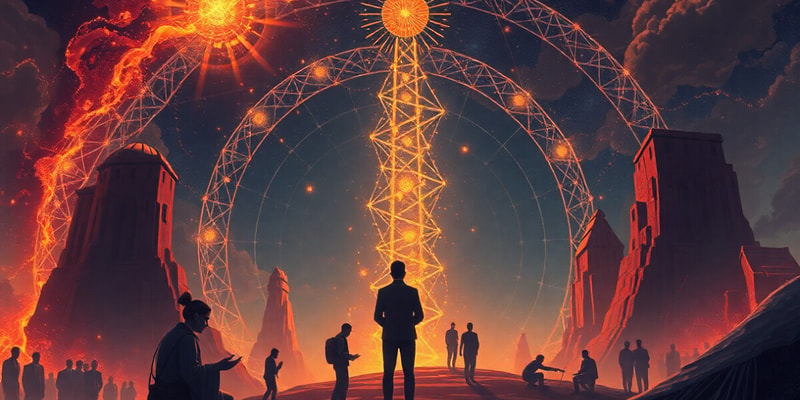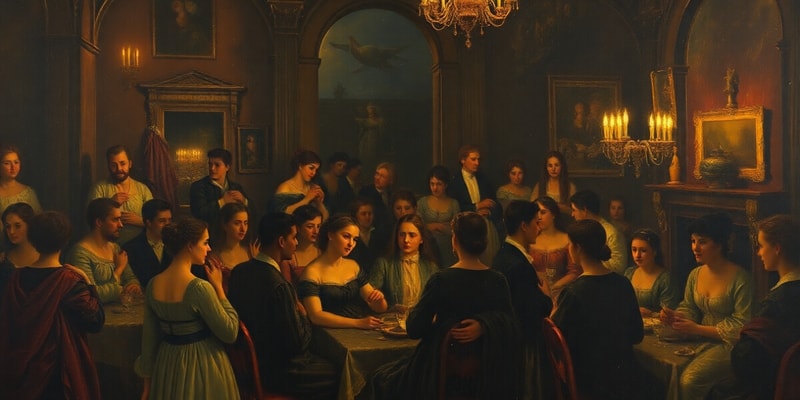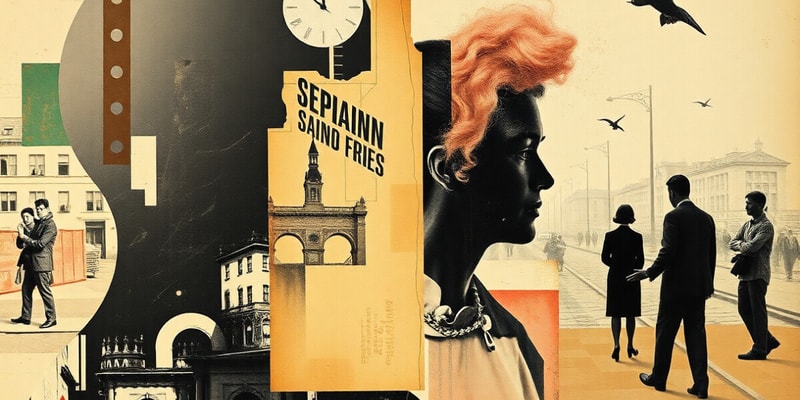Podcast
Questions and Answers
What does the sociological imagination specifically enable individuals to understand?
What does the sociological imagination specifically enable individuals to understand?
Which of the following best describes a macrostructure in sociology?
Which of the following best describes a macrostructure in sociology?
In the context of sociology, what is the primary focus of microstructure?
In the context of sociology, what is the primary focus of microstructure?
What significant societal transformation marked the beginning of the Industrial Revolution?
What significant societal transformation marked the beginning of the Industrial Revolution?
Signup and view all the answers
Which revolution is primarily characterized by citizens demanding greater political representation?
Which revolution is primarily characterized by citizens demanding greater political representation?
Signup and view all the answers
What is the primary characteristic of a counterculture?
What is the primary characteristic of a counterculture?
Signup and view all the answers
Which concept refers to the tendency to judge another culture by one's own cultural standards?
Which concept refers to the tendency to judge another culture by one's own cultural standards?
Signup and view all the answers
In the context of socialization, what does the term 'looking-glass self' refer to?
In the context of socialization, what does the term 'looking-glass self' refer to?
Signup and view all the answers
What is the term for cultural ceremonies marking life's transitions?
What is the term for cultural ceremonies marking life's transitions?
Signup and view all the answers
What term describes the tools and techniques people use to accomplish tasks within their culture?
What term describes the tools and techniques people use to accomplish tasks within their culture?
Signup and view all the answers
Which of the following best describes the concept of rationalization?
Which of the following best describes the concept of rationalization?
Signup and view all the answers
What aspect of culture is characterized by a mix of various cultural elements from different times and places?
What aspect of culture is characterized by a mix of various cultural elements from different times and places?
Signup and view all the answers
Which term refers to the socialization process that occurs outside the family after childhood?
Which term refers to the socialization process that occurs outside the family after childhood?
Signup and view all the answers
What is a significant outcome of the Sapir-Whorf hypothesis?
What is a significant outcome of the Sapir-Whorf hypothesis?
Signup and view all the answers
Which group is primarily responsible for maintaining cultural traditions and spirituality in Indigenous contexts?
Which group is primarily responsible for maintaining cultural traditions and spirituality in Indigenous contexts?
Signup and view all the answers
Which of the following best describes the concept of status?
Which of the following best describes the concept of status?
Signup and view all the answers
What is the main function of anticipatory socialization?
What is the main function of anticipatory socialization?
Signup and view all the answers
In the context of social roles, what does role strain refer to?
In the context of social roles, what does role strain refer to?
Signup and view all the answers
What effect does bystander apathy have on emergency situations?
What effect does bystander apathy have on emergency situations?
Signup and view all the answers
What is a primary group characterized by?
What is a primary group characterized by?
Signup and view all the answers
Which concept focuses on the visual indicators of a person's social position?
Which concept focuses on the visual indicators of a person's social position?
Signup and view all the answers
What describes the process of reconciliation in socialization?
What describes the process of reconciliation in socialization?
Signup and view all the answers
Which of the following best illustrates a social network?
Which of the following best illustrates a social network?
Signup and view all the answers
What characterizes a secondary group compared to a primary group?
What characterizes a secondary group compared to a primary group?
Signup and view all the answers
Dramaturgical analysis treats social interaction as what?
Dramaturgical analysis treats social interaction as what?
Signup and view all the answers
Which type of suicide is associated with a lack of integration into society and feelings of isolation?
Which type of suicide is associated with a lack of integration into society and feelings of isolation?
Signup and view all the answers
What is a characteristic feature of anomic suicide?
What is a characteristic feature of anomic suicide?
Signup and view all the answers
In the context of functionalist theory, what contributes primarily to social stability?
In the context of functionalist theory, what contributes primarily to social stability?
Signup and view all the answers
Which theory argues that tensions within social structures can lead to social change?
Which theory argues that tensions within social structures can lead to social change?
Signup and view all the answers
What does the term 'class consciousness' refer to?
What does the term 'class consciousness' refer to?
Signup and view all the answers
How does symbolic interactionism primarily view human behavior?
How does symbolic interactionism primarily view human behavior?
Signup and view all the answers
What is the primary focus of feminism as a theoretical perspective?
What is the primary focus of feminism as a theoretical perspective?
Signup and view all the answers
What does 'latent function' refer to in the context of social structures?
What does 'latent function' refer to in the context of social structures?
Signup and view all the answers
Which of the following best defines the term 'cultural harmony'?
Which of the following best defines the term 'cultural harmony'?
Signup and view all the answers
Which type of norm is considered a taboo?
Which type of norm is considered a taboo?
Signup and view all the answers
What does the term 'post-industrial revolution' refer to?
What does the term 'post-industrial revolution' refer to?
Signup and view all the answers
Which of the following best captures the definition of norms?
Which of the following best captures the definition of norms?
Signup and view all the answers
What does globalization primarily describe?
What does globalization primarily describe?
Signup and view all the answers
Which concept explains the struggle between social classes to overcome opposition?
Which concept explains the struggle between social classes to overcome opposition?
Signup and view all the answers
Study Notes
Sociology: The Study of Human Behavior
- Sociology is the systematic study of human behavior in a social environment.
- Social structures are stable patterns of social relations.
- Sociological imagination enables understanding the connection between personal troubles and social structures.
- Microstructures are patterns of social relations during face-to-face interactions.
- Mesostructures are patterns of social relations in organizations involving people who might not interact face-to-face.
- Macrostructures are overarching patterns of social relations that lie outside and above the community.
- Patriarchy is a system of power and customs that ensures male dominance in economic, political, and other life aspects.
- Global structures are patterns of social relations that transcend national boundaries.
Key Revolutions in Sociology
- Scientific Revolution (1550): Emphasized evidence-based conclusions over speculations.
- Democratic Revolution (1770): Citizens demanded increased political participation, challenging monarchical rule.
- Industrial Revolution (1780): Rapid growth of mechanized industry led to urbanization, factory work, and social changes.
Theoretical Perspectives in Sociology
-
Functionalist Theory: Social structures based on shared values contribute to social stability and govern human behavior.
- Egoistic Suicide: Lack of integration into society leads to feelings of isolation and suicide.
- Anomic Suicide: Vague social norms create uncertainty and a sense of meaninglessness, leading to suicide.
- Altruistic Suicide: Strong social norms prioritize the group's interests over the individual, leading to self-sacrifice.
- Dysfunction: Social structures can negatively impact social stability.
- Manifest Functions: Visible and intended effects of social structures.
- Latent Functions: Less visible and unintended effects of social structures.
-
Conflict Theory: Social structures are characterized by inequalities of wealth and power, leading to conflict and social change.
- Class Conflict: Struggle between social classes due to competing interests and resources.
- Class Consciousness: Awareness of one's position and shared interests within a social class.
- Cultural Harmony: The dominant class controls and shapes culture to maintain its power.
-
Symbolic Interactionism: Human behavior is governed by the meanings people attach to their social environment.
- Meaning: Social realities are constructed through shared interpretations.
- Interpersonal Communication: Meaning is created through interactions with others.
- Human Agency: Individuals shape society and are not merely passive recipients of social forces.
-
Feminism: Advocates for women's rights, focusing on gender, patriarchy, power, and social constructs.
- Gender: A central aspect of identity, not simply biological sex.
- Patriarchy: Systems of male dominance over women.
- Power and Convention: Male dominance arises from structures of power and societal norms, not biological differences.
- Micro and Macro Levels: Feminism examines gender issues at both individual and societal levels.
Postmodernism and Globalization
- Post-Structuralism: Challenges the stability of social relations and cultures.
- Post-Industrial Revolution: Shift from manufacturing to service industries, impacting all aspects of life.
- Globalization: Increasing interconnectedness of individuals, groups, institutions, and economies, leading to growing interdependence.
Culture: Shared Practices and Beliefs
- Culture: Socially transmitted practices, languages, symbols, and beliefs.
- Society: A group of individuals interacting in a defined territory and sharing a culture.
- Abstraction: Human ability to form general ideas and concepts.
- Symbols: Things that represent meaning.
- Cooperation: Shared resources and collaborative efforts to create complex social life.
-
Norms: Generally accepted ways of doing things.
- Folkways: Less important norms with minimal punishment for violation.
- Mores: Core norms essential for societal survival, with more severe consequences for violation.
- Taboos: Strongest norms, causing revulsion and severe punishment for violation.
- Production: Human capacity to utilize tools and techniques for resource exploitation.
- Material Culture: Tools and techniques used to accomplish tasks.
- High Culture: Primarily consumed by upper classes.
- Popular Culture (Mass Culture): Consumed by all classes.
- Dominant Culture: Controlled by powerful groups, shaping cultural values and practices.
- Subordinate Culture: Challenges dominant culture to varying degrees.
The Building Blocks of Culture
- Human Capacity: Abstraction, Cooperation, Production
-
Elements of Culture:
- Ideas
- Norms and Values
- Material Culture
Language and Culture
- Language: A system of symbols used for communication.
- Sapir-Whorf Hypothesis: Language influences how we perceive and experience the world.
- Rape Culture: A culture where sexual violence, harassment, and victim-blaming are normalized.
- Ethnocentrism: Judging other cultures solely by the standards of one's own.
Caste Systems and Multiculturalism
- Caste: Hereditary class based on religious authority.
- Multiculturalism: Government policies that promote and support culturally diverse communities.
- Cultural Relativism: Understanding and accepting cultural practices within their specific contexts.
Rites of Passage and Postmodernism
- Rites of Passage: Cultural ceremonies marking life transitions (birth, marriage, death).
- Postmodernism: Characterized by cultural mixing, erosion of authority, and declining consensus on core values.
Socialization: Learning Culture Throughout Life
- Socialization: Process of learning and internalizing cultural norms, values, and behaviors.
- Role: Expected behaviors associated with a social position.
- Self: One's sense of identity as an independent being.
- Looking-Glass Self: Self-perception based on how we believe others see us.
- I: The subjective and impulsive aspect of the self.
- Me: The objective component of the self, shaped by social interactions.
- Significant Others: Individuals who play key roles in early socialization.
- Generalized Other: Internalized image of societal expectations.
- Primary Socialization: Learning basic skills for family and societal functioning during childhood.
- Secondary Socialization: Socialization outside the family, through institutions like schools.
- Hidden Curriculum: Unwritten rules and expectations within educational settings.
- Thomas Theorem: Perceptions shape actions and consequences.
- Self-Fulfilling Prophecy: Expectations influence outcomes.
- Peer Groups: People of similar status, influencing socialization.
- Status: Recognized social position.
- Gender Roles: Socially defined expectations for behavior based on sex.
- Reconciliation: Rapid changes in roles and expectations, sometimes against an individual's will.
- Initiation Rite: Ritual signifying transition between groups, solidifying loyalty.
- Total Institutions: Isolated settings with strict control and supervision, influencing socialization.
- Anticipatory Socialization: Learning norms and behaviors of future roles.
- Virtual Communities: Groups connected online, fostering socialization.
Social Interaction and Social Organization
- Social Interaction: Communication and actions between people, structured by norms, roles, and statuses.
- Role Conflict: Incompatible demands on a person holding multiple statuses.
- Role Strain: Incompatible demands within a single status.
- Emotion Management: Controlling emotions to adhere to societal expectations.
- Emotion Labor: Emotional management as a part of paid work.
- Dramaturgical Analysis: View of social life as a performance.
- Role Distancing: Giving the impression of detachment from a role.
- Status Cues: Visual indicators of social position.
- Stereotypes: Oversimplified and rigid views of groups.
- Bureaucracy: Large, impersonal organization with hierarchical structure.
- Social Network: Connected units exchanging resources.
- Social Group: Individuals identifying with each other, with shared norms, roles, and statuses.
- Social Category: Individuals sharing a status but not identifying with each other.
- Groupthink: Conformity within a group, suppressing individual dissent.
- Bystander Apathy: Inaction in emergencies due to diffusion of responsibility.
- Reference Group: Group used to evaluate oneself or behavior.
- Primary Group: Small, intimate group with strong emotional ties.
- Secondary Group: Larger, more impersonal group with weaker ties.
- Formal Organizations: Organizations designed for specific objectives.
Studying That Suits You
Use AI to generate personalized quizzes and flashcards to suit your learning preferences.
Description
This quiz explores the fundamental concepts of sociology, including social structures, sociological imagination, and various levels of social relations. It also covers key revolutions that shaped the field of sociology. Test your knowledge on how societal patterns influence individual behavior.



